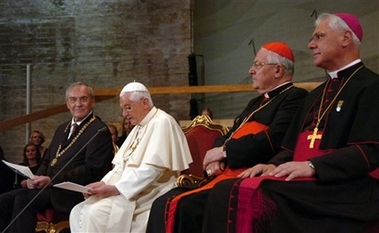VATICAN CITY - Pope Benedict XVI "sincerely regrets" offending Muslims with
his reference to an obscure medieval text that characterizes some of the
teachings of Islam's founder as "evil and inhuman," the Vatican said Saturday.

In this photo provided
by the Vatican newspaper L'Osservatore Romano, Pope Benedict XVI reads a
speech during a meeting on stem cells at Castel Gandolfo, the pontiff's
summer residence on the outskirts of Rome, Saturday, Sept. 16, 2006. Pope
Benedict XVI 'sincerely regrets'' that Muslims have been offended by some
of his words in a recent speech in Germany, the Vatican said Saturday amid
demands for apologies from much of the Islamic world and some reports of
violence. Second from right is outgoing Vatican Secretary of State
Cardinal Angelo Sodano, others are unidentified.
[AP] |
But the statement stopped short of
the apology demanded by Islamic leaders around the globe, and anger among
Muslims remained intense. Palestinians attacked five churches in the West Bank
and Gaza over the pope's remarks Tuesday in a speech to university professors in
his native Germany.
An Iraqi insurgent group threatened the Vatican with a suicide attack over
the pope's remarks on Islam, according to a statement posted Saturday on the
Web.
"We swear to God to send you people who adore death as much as you adore
life," said the message posted in the name of the Mujahedeen Army on a Web site
frequently used by militant groups. The message's authenticity could not be
independently verified. The statement was addressed to "you dog of Rome" and
threatens to "shake your thrones and break your crosses in your home."
In a broader talk rejecting any religious motivation for violence, Benedict
cited the words of a Byzantine emperor who characterized some of the teachings
of the Prophet Muhammad as "evil and inhuman," particularly "his command to
spread by the sword the faith."
The pontiff did not endorse that description, but he did not question it, and
his words set off a firestorm of protests across the Muslim world.
The new Vatican secretary of state, Cardinal Tarcisio Bertone, said the
pope's position on Islam is unmistakably in line with Vatican teaching that says
the church "esteems" Muslims.
Benedict "thus sincerely regrets that certain passages of his address could
have sounded offensive to the sensitivities of the Muslim faithful and should
have been interpreted in a manner that in no way corresponds to his intentions,"
Bertone said in a statement.
He noted that earlier during his German trip, Benedict warned "secularized
Western culture" against holding contempt for any religion or believers.
Bertone said the pontiff sought in his university speech to condemn all
religious motivation for violence, "from whatever side it may come." But the
pope's words only seemed to fan rage.
Bertone's statement, released Saturday by the Vatican press office, failed to
satisfy critics, although British Muslim leaders said it was a welcome step.
Mohammed Bishr, a senior Muslim Brotherhood member in Egypt, said the
statement "was not an apology" but a "pretext that the pope was quoting somebody
else as saying so and so."
"We need the pope to admit the big mistake he has committed and then agree on
apologizing, because we will not accept others to apologize on his behalf,"
Bishr said.
There was no indication whether the pope would do so. His first public
appearance since his return from Germany was set for Sunday, when Benedict
planned to greet the faithful at Castel Gandolfo, the papal summer residence in
the Alban Hills near Rome.
Morocco recalled its ambassador to the Vatican on Saturday to protest the
pope's "offensive" remarks, and Afghanistan demanded the pope apologize.
Turkey cast some doubt on whether Benedict could proceed with a planned visit
in November in what would be the pontiff's first trip to a Muslim nation.
Turkish Prime Minister Recep Tayyip Erdogan insisted the pope apologize to
the Muslim world, saying he had spoken "not like a man of religion but like a
usual politician."
Asked if Muslim anger would affect the pope's trip to Istanbul, where he
hopes to meet with Orthodox leaders headquartered there, Erdogan replied, "I
wouldn't know."
Turkey's top Islamic cleric, Religious Affairs Directorate head Ali
Bardakoglu, welcomed the Vatican statement.
"He says that he respects Islam and didn't want to hurt the feelings of
Muslims. I find that a civilized position," said Bardakoglu in an interview
posted on the Web site of Germany's Der Spiegel magazine.
Ecumenical Patriarch Bartholomew I, spiritual leader of the world's 200
million Orthodox Christians, issued a statement saying he was deeply saddened by
the tensions sparked by the pope's comments.
"We have to show the determination and care not to hurt one another and avoid
situations where we may hurt each others' beliefs," the Istanbul-based
Patriarchate said.
| 1 | 2 |  |